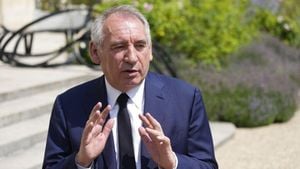Prince Andrew, the Duke of York, is once again under scrutiny due to his alleged connections with a man suspected of being a Chinese spy. This situation escalated after national security concerns prompted the UK government to bar the businessman, known only as H6, from re-entering the United Kingdom. This pivotal move was recently upheld by the Special Immigration Appeals Commission (SIAC), which raised alarms about H6's ties to the Chinese Communist Party (CCP) and his close relationship with the royal.
The saga began to unravel when it was revealed through court documents and various reports, including those from family members and aides, detailing how this businessman had reportedly enjoyed significant access to Prince Andrew. Some reports indicated he was even included at the prince's birthday party, marking his importance within Andrew's social circle. Yet, the Duke's office quickly insisted all communication ceased following advice from the government, emphasizing no sensitive topics were ever discussed.
The Home Office revealed the individual had previously been authorized to act on Andrew’s behalf concerning potential investments within China, raising concerns about the potential for political interference. The tribunal's decision to uphold the exclusion order highlighted the pressures Prince Andrew faced and how they could have made him vulnerable to exploitation.
H6 originally came to the UK from China as a student around 2002, pursuing studies at the University of York. He eventually formed his own business advocating for Chinese investments within British firms. This business background aided his cultivation of relationships with UK elites, which sparked growing concerns about possible foreign influence near the royal family.
Support for H6's exclusion from the UK emerged from various government officials, who suggested his proximity to the prince presented serious risks, particularly during Andrew’s tumultuous period following accusations surrounding his friendship with convicted sex offender Jeffrey Epstein. According to the tribunal, H6 was involved with the CCP's United Front Work Department, which aims to influence foreign entities politically and economically.
Despite the situation casting dark clouds over Andrew, who has seen his royal duties stripped following persistent controversies, the Duke remains vocally supportive of compliance with government advice. His latest statement reiterates his decision to limit contact with the businessman after being fully apprised of the situation's gravity. He expressed: "The Duke met the individual through official channels, with nothing of a sensitive nature ever discussed. He is unable to comment any more on matters related to national security."
The tensions between maintaining royal relationships and potential foreign influence have sparked frustration both within governmental circles and the public. Comments made by former UK security officials reflect this frustration. They view the entire episode as exceedingly embarrassing for the royal family, especially for Andrew, whose reputation has already been extensively marred. MP Tom Tugendhat articulated this sentiment, remarking on the situation as damaging to the monarchy.
According to SIAC, the relevance of H6 being barred from the UK rested on the idea of ‘an unusual degree of trust’ formed with Andrew, and the estimates of what is perceived as the duke's precarious situation during this period. This dynamic stirred fears over how close relationships could be manipulated by foreign entities, especially when exerting pressure on someone already vulnerable, as Prince Andrew appeared to be.
The case adds yet another chapter to Prince Andrew's controversial narrative, which includes previous allegations and governs his gradual descent within the royal framework. Public perception remains divided; many believe his associations with figures from outside the UK are indicative of poor judgment, raising the question of whether he has truly absorbed the lessons from past events. Meanwhile, this young man—his former adviser—has found himself standing before authorities, pushed back by the very country he hoped to maintain as his second home.
At the same time, the Chinese government countered charges made against H6, dismissing accusations as attempts to smear their nation. They claimed these actions by British officials were driven by paranoia rather than grounded facts, effectively bending the narrative to reflect its own interests.
While the truth surrounding H6’s motivations and relationships may eventually come to light, one thing remains clear: the incident serves as another reminder of how precarious the balance between royalty and the outside world can be. Prince Andrew's attempt to re-establish his public posturing following the Epstein debacle has become even more complicated by this most recent liaison.
For members of the royal family, who have long operated within carefully curated circles, the blurred lines between personal friendships and potential political entanglements take on unprecedented significance. Every handshake and invitation now carries weight, underscoring the necessity for vigilant oversight of both past affiliations and current associations. Only time will tell how this saga will shape not just Andrew but the royal family moving forward.



